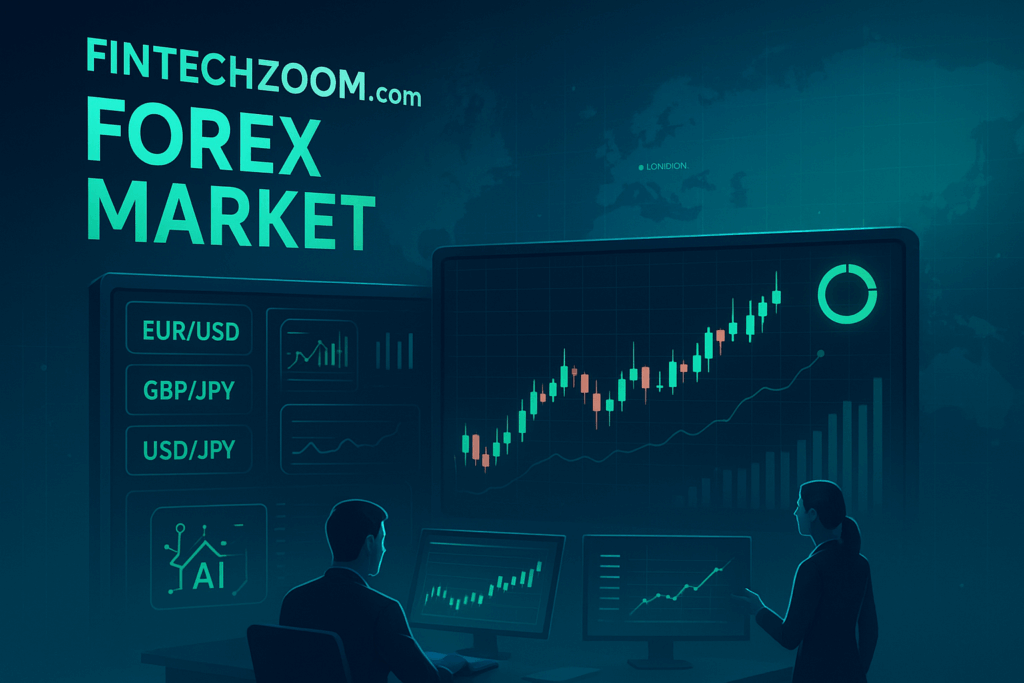Introduction
The foreign exchange market, often known as the forex market, is the largest and most liquid financial marketplace in the world. Every day, trillions of dollars are exchanged between banks, institutions, corporations, and individual traders. Many websites and resources help explain how this global system works, and one of the platforms that stands out is fintechzoom.com forex market.
If you are someone looking to understand the basics of currency trading, liquidity, and how to enter the market with confidence, this article will walk you through everything in a simple way.
What Makes the Forex Market Unique?
The forex market is unlike any other financial market because of its scale and accessibility. While stock exchanges operate with limited trading hours, forex is open 24 hours a day, five days a week. This allows people from all time zones to participate without restrictions.
When you visit fintechzoom.com forex market, you will notice an emphasis on explaining why liquidity and constant activity matter. A liquid market means trades can be executed quickly, with little risk of sudden price manipulation, giving participants confidence.
The Size of the Global Forex Market
The size of the forex market is massive. On average, the daily trading volume exceeds $6 trillion globally. This makes it larger than the stock and commodities markets combined.
Why does this matter? Because the more active and liquid a market is, the easier it is to find opportunities. The fintechzoom.com forex market section highlights this advantage by showing how traders benefit from rapid price movements and global participation.
Currency Pairs and How They Work
Trading in forex always happens in pairs. For example, EUR/USD represents the euro against the U.S. dollar. When you buy this pair, you are essentially buying euros while selling U.S. dollars at the same time.
The fintechzoom.com forex market guide explains that pairs are divided into three categories:
- Major pairs (like EUR/USD, GBP/USD, USD/JPY)
- Minor pairs (currency pairs excluding the U.S. dollar)
- Exotic pairs (involving emerging market currencies)
This classification helps traders know which markets are more stable and which are riskier but potentially more profitable.
Why Liquidity Is Important
Liquidity means how quickly an asset can be bought or sold without affecting its price. The forex market is considered highly liquid because of its sheer size and global participation.
The fintechzoom.com forex market coverage emphasizes liquidity as a safety net for traders. Since millions of trades happen every second, the spreads (the difference between buying and selling prices) remain narrow, making trading more cost-effective.
Key Participants in the Forex Market
Understanding who drives the forex market is crucial. The participants include:
- Central Banks – They influence currency values through monetary policies and interventions.
- Commercial Banks and Financial Institutions – They conduct the majority of forex trading worldwide.
- Corporations – Global companies trade currencies to manage their international operations.
- Retail Traders – Individuals who participate through brokers.
By reading about the fintechzoom.com forex market, beginners gain insights into how each participant plays a role in moving exchange rates.
Benefits of Trading in the Forex Market
There are several reasons why millions of traders are attracted to forex:
- 24-Hour Market: Unlike stock exchanges, forex never sleeps.
- High Liquidity: Easier to execute trades quickly.
- Leverage: Brokers allow traders to control larger positions with smaller amounts of capital.
- Low Costs: Most forex trades involve very small transaction fees.
The fintechzoom.com forex market overview highlights these benefits, showing why both beginners and professionals are interested in currency trading.
Risks in Forex Trading
Of course, trading in the forex market is not risk-free. Some of the challenges include:
- High Volatility: Exchange rates can move unpredictably.
- Leverage Risks: While leverage increases profit potential, it can also magnify losses.
- Global Events: Political instability, natural disasters, or central bank announcements can drastically affect currencies.
When discussing risk, the fintechzoom.com forex market content stresses the importance of risk management strategies such as using stop-loss orders and avoiding over-leveraging.
Trading Strategies for Success
Every trader needs a strategy. Without a clear plan, trading can become emotional and unorganized. Common approaches include:
- Day Trading – Opening and closing positions within the same day.
- Swing Trading – Holding trades for several days to catch medium-term movements.
- Scalping – Executing many trades in a single day for small profits.
- Long-Term Trading – Holding positions for weeks or months, based on economic trends.
The fintechzoom.com forex market guide gives useful insights on how each strategy fits different trader personalities and risk levels.
Technology and Forex Trading
Modern forex trading would not be possible without technology. Online platforms, mobile apps, and advanced charting tools have transformed how traders interact with the market.
The fintechzoom.com forex market highlights the role of digital platforms in providing real-time data, automated trading systems, and analytical tools that allow even small retail traders to compete on a global stage.
How Beginners Can Start Trading
Starting in the forex market does not require a huge investment, but it does require preparation. Steps include:
- Educate Yourself – Learn the basics of currency pairs, market movements, and strategies.
- Choose a Broker – Find a reliable broker that offers a secure platform.
- Open a Demo Account – Practice without risking real money.
- Start Small – Begin with limited capital and increase gradually.
- Use Risk Management Tools – Always set stop-loss levels to control losses.
The fintechzoom.com forex market beginner’s guide reinforces the importance of building knowledge before trading with real funds.
Forex Market Facts That May Surprise You
- The U.S. dollar is involved in over 80% of forex transactions.
- London is the largest forex trading hub in the world.
- The forex market is older than the modern stock market.
- Robots and algorithms conduct a significant portion of trades daily.
Such facts are often highlighted in fintechzoom.com forex market discussions to show how diverse and dynamic the industry truly is.
Conclusion
The forex market is a massive, dynamic, and liquid financial system that attracts millions of participants worldwide. For anyone seeking to understand its size, structure, and opportunities, resources like fintechzoom.com forex market provide valuable insights.
By learning about currency pairs, liquidity, participants, benefits, and risks, traders can make more informed decisions. Whether you are a beginner just starting out or an experienced investor, staying updated with reliable information is the best way to succeed in forex trading.
The journey may seem complex at first, but with consistent learning and practice, the forex market can become an exciting avenue for financial growth. And with platforms like fintechzoom.com forex market offering clear explanations and tools, the path becomes much easier to navigate.

